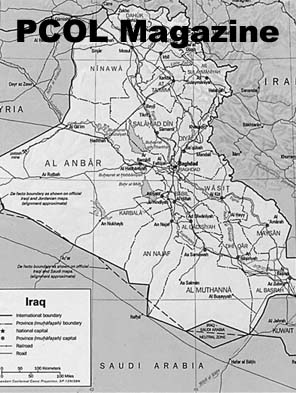
A Double Ordeal for Female Prisoners in Iraq
A Double Ordeal for Female Prisoners
Tue May 11, 7:55 AM ET
By Tracy Wilkinson Times Staff Writer
BAGHDAD — One woman told her attorney she was forced to disrobe in front of male prison guards. After much coaxing, another woman described how she was raped by U.S. soldiers. Then she fainted.
A U.S. Army report on abuses at Abu Ghraib prison documented one case of an American guard sexually abusing a female detainee, and a Pentagon (news - web sites) spokesman said Monday that 1,200 unreleased images of abuse at Abu Ghraib included "inappropriate behavior of a sexual nature."
Whether it was one or numerous cases of rape, many Iraqis believe that sexual abuse of women in U.S.-run jails was rampant. As a result, female prisoners face grave prospects after they are released: denial, ostracism or even death.
A woman who is raped brings shame on her family in the Islamic world. In many cases, rape victims have been killed by their relatives to salvage family honor, although there is no evidence this has happened to women who have been prisoners in Iraq (news - web sites).
"It is like being sentenced to death," said Sheik Mohammed Bashar Faydhi, a senior cleric based at Baghdad's largest Sunni mosque.
Some Iraqi women said they were struggling to come to terms with the alleged abuses of female detainees at Abu Ghraib and other U.S.-controlled lockups. Few female inmates will talk about it. Their lawyers lower their voices when the subject of rape comes up.
"I hope it's not true, because were it to be true, it is just too horrible to imagine," said Rajaa Habib Khuzaai, an obstetrician who is one of three women on the Iraqi Governing Council.
This week, Khuzaai was allowed access to a detention center housing women — a privilege rarely granted to outsiders before the scandal.
But female lawyers who visited the prison in March said their clients provided accounts of abuse and humiliation.
To enter the prison west of Baghdad, the attorneys waded through dirt and coils of barbed wire, and waited for hours.
Inside, they met with nine female detainees — four of whom, they said, had not been charged with any crime. U.S. military officials said at the time that there were 10 or 11 women being held at Abu Ghraib.
One lawyer, Sahra Janabi, said her clients found it difficult to talk about their experiences in prison. Seemingly minor actions by U.S. soldiers, such as removing a woman's head scarf, represented a violation to these Muslim women.
A prison translator was present in the meetings and took notes, Janabi said.
"We could not talk freely," she said. "The women were devastated. They broke down crying."
According to Janabi, only one prisoner, a middle-aged owner of a cigarette stand, would speak openly, and said she did not care if the guards punished her.
She told the lawyers that she had been forced to disrobe in front of male guards, an action that an Iraqi translator found so disgraceful he turned his head away in embarrassment.
Janabi and her colleagues said many women who had been detained are wives or relatives of senior Baath Party officials or of suspected insurgents. U.S. Army officials have acknowledged detaining women in hopes of persuading male relatives to provide information. The lawyers said interrogators sometimes threatened to kill detainees.
Dozens of people — lawyers, Iraqi officials, Iraqi and foreign human rights activists — have sought access to the prisons during the last year with minimal success. Stories of physical and sexual torture were rampant for much of that time. Iraqi officials and lawyers say U.S. military and governmental secrecy created a climate that allowed abuses.
Women represented a small percentage of about 40,000 detainees processed by U.S. authorities.
Once the women are freed, a new trauma begins, Iraqis say.
Khuzaai, the Governing Council member, said most female detainees cannot talk about what they've been through. They and their families try to pretend nothing ever happened, she said.
Another lawyer, Amul Swadi, said her client fainted before providing further details of being raped and knifed by U.S. soldiers.
Five former detainees described to their lawyers having been beaten. But they did not say they had been raped.
"They are very ashamed," Janabi said. "They say, 'We can't tell you. We have families. We cannot speak about what happened.' "
In Iraq, silence may be their best protection.
Faydhi, the cleric, said an Iraqi man cannot acknowledge having had a female relative in prison. The shame, he said, is bad enough if the woman was in an Iraqi jail. To have been taken by the Americans compounds the humiliation.
Her life may be in danger especially if the woman is from a large, prominent tribe, he said, and her family believes she has been raped, Faydhi said.
Faydhi, an official with Iraq's Board of Islamic Clergy and a professor at the Islamic University, said a man will be discouraged from killing his female relative who has been released from prison if he seeks permission of an imam to restore the family's honor. But the cleric also said imams have limited ability to prevent this kind of murder.
"I would remind him that she is a victim, and ask, how can we victimize her even more? I would tell him to keep it secret, but that if word gets out, I would try to convince him that she should be seen as a patriotic symbol," Faydhi said. "But it is really difficult to convince an Iraqi to think in such a manner."
Khuzaai said the stigma would be unbearable.
"Like any woman who is raped, there is the mental, psychological breakdown and everything that is related to the self," she said. "But then there's the family and society. If a rape has happened, a family will never talk about it, not to the public, and maybe not even among themselves."
